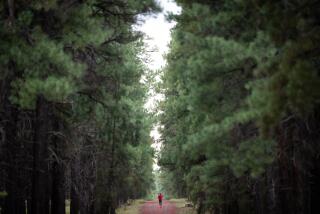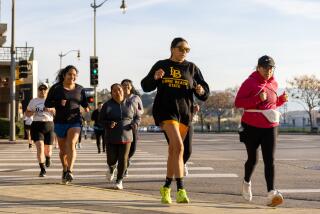A High Estimate : Ashimine’s Gardena Running Club, Begun by an Ulcer, Is in No Need of Repair
- Share via
It’s a typical Monday at Gardena Auto Repair, a small, burgeoning business started by Dan Ashimine as a one-man back-yard shop 16 years ago.
There are now 16 employees, and today, like most days, the shop’s parking lot is filled with cars awaiting service. In the office, a small house located adjacent to the parts department and five service garages, Ashimine is hard at work.
“I’ve got about all the business I want and more,” Ashimine, 49, said between telephone calls and repair estimates.
It was not always that way.
Ashimine says he smoked two packs of cigarettes a day and was a “semi-alcoholic” before developing an ulcer, which he attributes to the stress of operating his struggling, year-old business in 1977.
He started running to relieve tension and resolved to stop smoking and drinking.
A few months later, he completed his first marathon in 3 hours 40 minutes 27 seconds. Almost 70 marathons later, he has improved to 2:38:58 for the 26.2-mile race, and his ulcer has not resurfaced.
In 1982, Ashimine recruited a few friends to run a 20-kilometer relay race. As incentive, he had uniforms printed bearing the shop’s logo.
“It was just supposed to be a one-shot deal,” Ashimine says.
But from that four-man team, the Gardena Reebok Runners were born and they have grown into one of the largest road racing clubs in the nation. Ashimine serves as coach, director and, at times, counselor to the club’s 300 members, ranging in age from 8 to 80 and in ability from beginner to national class.
“It started off with friends telling friends,” Ashimine said. “When I started, all I wanted was to have people to run with and help each other. From that little team, it just kept growing and still hasn’t stopped growing. It’s been incredible and beyond any of my expectations.”
Many have been attracted to the club by Ashimine’s coaching. Through trial and error, he has developed an unorthodox theory of distance running that he calls “discipline training.”
Contrary to conventional programs that call for workouts run faster than race pace, Ashimine says a runner must resist the temptation to run hard during training to preserve the effort for race days and to minimize injury. One must go slow in order to run fast.
Ashimine, who did not compete in high school or college and has no formal background in distance running, prescribes 90 to 100 miles per week, all at an easy pace.
“I tried everything the hard way,” he says. “I followed it and it worked. It’s very simple but very effective.”
Although Ashimine’s philosophy often comes under scrutiny, his club’s achievements are hard to ignore:
--In 1988, five members qualified for the U.S. Olympic marathon trials, and two qualified this year.
--In the U.S. Olympic track and field trials at New Orleans in June, Mark Junkermann, 27, of Santa Monica advanced to the semifinals in the 3,000-meter steeplechase.
--Angel Martinez, 18, a freshman at Mt. San Antonio College, won the State Division I cross-country title at San Gabriel High last season and ran the fastest 3,200-meter time in the nation, 8:56.34, at the State track and field meet.
However, Ashimine is equally proud of the success he has had with average and slower runners, whom he calls the “heart” of the club.
“The biggest challenge is to give them results,” Ashimine says. “Every time I take on one individual and get involved with that one person, it doesn’t matter how long it takes. I’m convinced you can make a runner.”
Ashimine spends his week planning activities and coaching. Mondays, he consults with the 34 runners he is preparing for the St. George Marathon in Utah in October. Ashimine charges no membership fee and encourages all runners to join. “As long as they are sincere and don’t waste my time,” he says.
The club has also contributed to the community. Its annual race, the Gardena 5,000, attracted nearly 3,000 participants and helped raise more than $20,000 for local nonprofit groups. In May, at the Jimmy Stewart Relay Marathon in Griffith Park, a race to benefit St. John’s Hospital and Health Center in Burbank, Ashimine entered 29 five-member teams at a cost of $500 a team.
While the sponsorship of Reebok and occasional contributions from members have helped defray expenses, Ashimine still shoulders much of the cost of uniforms and shirts. He often pays entry fees and travel costs to races for members.
“A lot of times, when people have something, they don’t want to share it. Dan’s not like that,” says Matt Ebiner, 31, of West Covina, a two-time U.S. Olympic marathon trials qualifier who placed 15th in the 1987 Los Angeles Marathon. “He doesn’t care if athletes are at the front of the pack or the rear, he just wants to see them succeed, not only in running, but in life.”
Runners stop by the shop to drop off training diaries, which include the time, distance and comments from each run the previous week, and to pick up a new schedule. Others phone or fax the information to Ashimine.
“Running a business and running a club is a big challenge in my life,” Ashimine says, putting his hands behind his head and reclining on a chair in his office, a small room decorated with photographs of club members in action.
“The time spent on running takes away from business, but you have to put in longer hours to compensate.”
Ashimine pauses, glances at his digital running watch and takes note of the crowd starting to gather in the office.
“It’s past 11:30 already?” he asks in a puzzled tone while hurriedly slipping on a pair of running shoes soiled by oil and grease. “We have to get going. It’s late.”
Lunchtime has arrived, but for Ashimine it’s time to join the dozen or so members who come to the shop for a daily 10- to 15-mile run around nearby El Camino College in Torrance.
Their pace is slow and, at times, barely a shuffle, as they trot along in the intense midday sun.
The runners, many wearing the club’s distinctive yellow T-shirts or jerseys with the shop’s logo, talk among themselves, stopping at red lights and taking a break every few miles for water.
It’s after 1 p.m. by the time everyone returns to the shop. A stack of telephone messages awaits Ashimine, many from members inquiring where the club plans to race that weekend.
Ashimine will fly to Hawaii to pace a member in the 10-mile running leg of a triathlon, but he decides to send the club to a 10K in Signal Hill on Saturday. Sunday morning is reserved for a 21-mile hill workout in Palos Verdes.
“Spread the word,” Ashimine tells the runners as they begin to leave the shop.
Ashimine shakes his head and laughs, thinking about what he has said. He knows that would not be a problem. “I guess that’s been the whole reason why the club keeps surviving,” he says.
More to Read
Inside the business of entertainment
The Wide Shot brings you news, analysis and insights on everything from streaming wars to production — and what it all means for the future.
You may occasionally receive promotional content from the Los Angeles Times.










